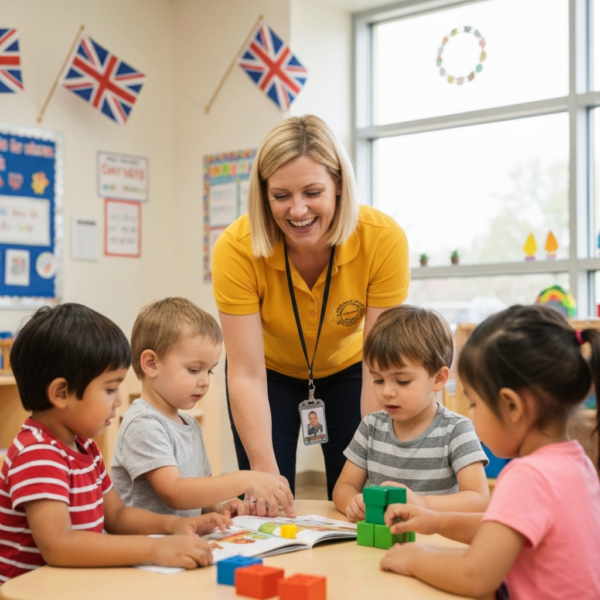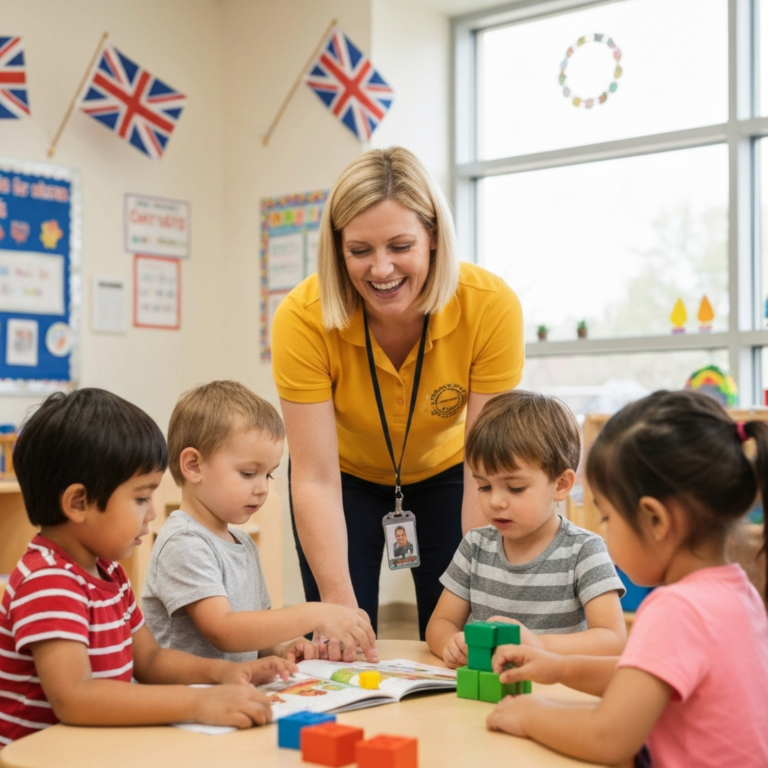Key Highlights: What Age Do Kids Start School
- The answer to “what age do kids start school” can be different depending on the country or area you live in. Families should check the local rules to know for sure.
- In Canada, most children go to kindergarten when they are four or five years old, and they start required school at age six.
- In the United States, many kids begin kindergarten at age five, but each state can have different rules about how old you have to be to attend school.
- The UK and Australia do things a bit differently. In the UK, formal schooling starts at age five, while, in Australia, it usually begins at age six.
- Some things like cut-off dates, letting kids start early, or waiting to start school can change when a child has their first day of school year.
- If parents understand the grade 1 entry age and know about preschool options, it can help them get ready for their child’s first day of school and plan for future learning.
Introduction
Understanding how a child starts school means knowing why the school starting age matters. Many parents must figure out the right age for preschool, kindergarten, and moving on to the next step. The question of what age do kids start school is often influenced by local school board regulations and the rules of the education system in their area.
Parents need to know about cut-off dates and what is needed to start. This helps make the move to primary school much smoother. Learning about what age do kids start school can help parents make good choices for their child’s future success and social development. It can also give their child the best chance of doing well in and out of school.
What Age Do Kids Start School in Canada?
In Canada, most children go to preschool when they are about 3 or 4 years old. By the time they are 5, they start kindergarten. Grade 1 usually begins at age 6. But, the age your child starts each of these can change, because different provinces have their own rules. It is important for parents to know about these rules when they think about their child’s schooling.
Overview of Typical Entry Ages for Preschool, Kindergarten, and Grade 1
Entry ages for preschool, kindergarten, and grade 1 in the education system in Canada are not the same everywhere. Most children start preschool when they are about three years old, which is considered a common preschool starting age. By age four, they move to junior kindergarten. At five, they go on to senior kindergarten.
After this, most kids start grade 1 when they turn six. These starting ages help give a child’s education a strong foundation. In these early years, children build social skills and go through important early childhood development. This is key for later academic success and good social development as they grow.
Key Differences Between Provinces and Territories
The school entry age in Canada is not the same in every province or territory. This has a big effect on a child’s learning. You can see the difference with some provinces letting kids start school when they are four in preschool programs. In other places, children must be five years old to begin kindergarten.
The cut-off dates for school, set by the local school board and the ministry of education, also decide if your child will start in junior or senior kindergarten. Because these rules can change, it’s important for parents to check with the school board in their area and look up ministry of education’s guidance for the best school start for their kids.
School Starting Ages in Ontario
In Ontario, kids start junior kindergarten when they turn four. At five, they go to senior kindergarten. This helps them get ready for school and learn many social skills. The way they move through these early years gives a strong foundation for future learning in school.
It’s important for parents to know these starting ages. This goes with rules set by the local school board and the education act. The time when a child starts can change how well they join into the school community later. A good start helps all kids grow and learn better in early childhood education.
When Children Begin Junior and Senior Kindergarten
Children usually start junior kindergarten when they are four years old. This is the time when they begin early childhood education. During this phase, they work on social skills, basic literacy, and take part in physical activity. All these things help them build a strong start and foundation for learning.
When children turn five, they move up to senior kindergarten. Here, the school year gets a bit more organized. Kids start to learn about social studies and math. This step not only boosts their thinking skills but also helps them get ready for the next school year and the new things they will face in grade 1.
Is Kindergarten Attendance Mandatory in Ontario?
In Ontario, it is not a rule that kids must go to kindergarten. Children can start junior kindergarten when they are four years old. Parents can choose to wait and send their child to senior kindergarten or start even later. This choice depends on the child, what they need, and what works best for the family.
Primary School Entry Requirements Across Canadian Provinces
Entry requirements for primary school and secondary school education in Canada can be different in each province. This is because every area has its own school system rules. Usually, children need to be a certain age for kindergarten and grade 1. Local school boards help parents know about the rules. Most schools ask for proof of residency and health records. This makes it easier for your child’s first day to go well. When you know what the school system wants, you can help your child get ready for primary school. This way, they can have a strong foundation for their education from the start.
Comparison Table: Entry Ages for Kindergarten and Grade 1 by Province
Having a good grasp of when kids start kindergarten and grade 1 shows how age rules in each province can be different in Canada. Most places have preschool for kids as young as four. Kids start kindergarten somewhere between four and six, depending on the area. Children go into grade 1 at age six or seven most of the time. It’s quite important to know this because the education system in Canada sets these rules. The way these age limits work can change a child’s learning journey and help them fit into their school community better right from the beginning.
| Province/Territory | Kindergarten Entry Age | Grade 1 Entry Age |
| Alberta | 5 years | 6 years |
| British Columbia | 5 years | 6 years |
| Manitoba | 5 years | 6 years |
| New Brunswick | 5 years | 6 years |
| Newfoundland & Labrador | 5 years | 6 years |
| Northwest Territories | 5 years | 6 years |
| Nova Scotia | 5 years | 6 years |
| Nunavut | 5 years | 6 years |
| Ontario | 4 years (Junior K) | 6 years |
| Prince Edward Island | 5 years | 6 years |
| Quebec | 5 years (Pre-K) | 6 years |
| Saskatchewan | 5 years | 6 years |
| Yukon | 4 years (Early K) | 6 years |
Note: Entry ages are based on the age the child will be as of December 31st of the school year in most provinces, but requirements may vary.
Preschool and Pre-Kindergarten Options
There are different choices for preschool and pre-kindergarten to help with early childhood development. Some programs offer half-day sessions, while others offer full-time care in a well-equipped school building. These help children grow their social skills and work on their communication of learning.
The goal is to give every child a strong foundation for future success in school education. Parents can pick from public, private schools, or community-based centers for their child’s learning. This helps make sure every child can get what they need and can move into kindergarten more easily.
Understanding School Cut-Off Dates and Their Impact
Cut-off dates help decide when a child can start school. They are important because they set the age a child needs to be to join programs like kindergarten or grade 1. These rules can shape your child’s school year and have an impact on their entire school journey. When parents know about these dates, they can better decide if early school entry or waiting another year is the right choice regarding potential late school entry.
This helps them look at if their child is ready in terms of social development and if they fit well in the school system. Making the right choice at this stage gives your child a strong foundation for future learning and sets them up for a good school year.
How Cut-Off Dates Determine School Starting Age
Cut-off dates are important in the education system. They help decide when children start school. Local school boards set these dates. There is a certain age that your child must reach to be able to join preschool, kindergarten, or grade 1. So, your child’s birthday decides if they can get into school that year or if they have to wait.
This does not just affect when they start learning. It also can change the way they grow up, how they get along with other children, and the way they do in school. Knowing about these rules can help parents find the best way for their child to move through the education system and support their social development.
Late Birthdays, Early Entry, and Deferred Entry Policies
Starting school can be hard to figure out, especially if your child has a late birthday. Some schools let kids start early if they are ready. Others let you wait and start later if you think your child needs more time. Knowing about these choices is important for your child’s education. It helps make sure the school supports them well. That way, their social skills and feelings can grow in the best way, and the move into school will go more smoothly.
What Parents Need to Enroll Their Child in School
It is important to have the right papers when you want to sign your child up for school. You will need to bring proof of where you live and your child’s birth certificate. Also, make sure to have a record of your child’s shots. This shows the school that your child’s health is looked after, which is good for everyone in the school’s community.
You should learn about the steps your local school board uses for school applications. This will help you get through the enrollment process faster. It also helps to know if your child is ready for their grade level in school. Watching for signs like how well they get along with others and if they are interested in learning can help your child feel good and confident about starting this new part of their life.
Required Documentation and Application Process in Ontario

Enrolling your child in school in Ontario needs some specific documents for your child’s school. This helps things go smoothly on the first day. You have to give proof of your child’s age, such as a birth certificate or passport. You also need to show proof of where you live, like a utility bill or lease agreement.
To start the process, you must fill out forms from the local school board. It is good for parents to talk clearly with the people at the school, including the school council, throughout the process. Make sure you send all the paperwork on time. This makes it easier for your child on the first day of school and helps them get started in the education system without problems.
School Readiness: Signs Your Child Is Ready to Start
Knowing when a child is ready for school is important. You can look at a few key signs to see if your child is ready to join the school community. One sign can be when they follow instructions, talk about what they think, and play well with others at different times. These actions help develop social skills.
Another thing to notice is if they show an interest in learning. For example, they may like storytelling or want to try simple math. This shows they are excited about learning new things.
It is also good to see if they can manage their feelings and be patient. This kind of emotional maturity shows they have a strong foundation for moving into a school setting. All these things together will help them start school and fit in well.
Conclusion
Starting school can be a big step in the life of your child and your family. Knowing what age do kids start school and the rules in different provinces helps you to get ready for their first year of school and their first day. It’s important to look at things like cut-off dates and how the sign-up process works.
These help you and your child have a smooth start to their school year and make their first day of school a good one. When you plan ahead, you help your child’s education and give them a strong foundation for learning, not only in the first year of school but in every year after. That way, their child’s learning can be the best it can be, and their first day leads to many other good school days.
At UsCA Academy, we understand the importance of this transition. Our programs are designed to support parents and children alike, ensuring that when the time comes to ask, “What age do kids start school?” you feel confident and prepared. We offer resources and guidance to help families navigate the school enrollment process, providing a nurturing environment where children can thrive. With our dedicated staff and comprehensive curriculum, UsCA Academy is committed to making your child’s educational journey a positive experience from day one.
Frequently Asked Questions
1. Can my child start school early or delay entry in Ontario?
In Ontario, it be possible for children to start school early. Parents need to go through an application process with the local school board for this. Most of the time, kids born just before the cut-off date can get early school entry. If parents think their child is not ready, they can ask the school board for a late start instead. To learn how it works, talk to your local school board about the guidelines.
2. What ages correspond to each grade in Canadian schools?
In Canadian schools, most children begin grade 1 when they are 6 years old. Many start kindergarten when they are 4 or 5. Preschool usually starts for kids who are around 3 or 4 years old. The age for starting each level can change a bit. It depends on the rules and cut-off dates set by each province.
3. What are some signs that indicate a child is ready to start school?
Some signs that show if a child is ready to start school are when they can follow simple instructions and talk with friends. The child should be able to say what they need and show interest in learning new things. Also, being able to take care of themselves and be okay with their feelings are good signs that the child is ready for school









